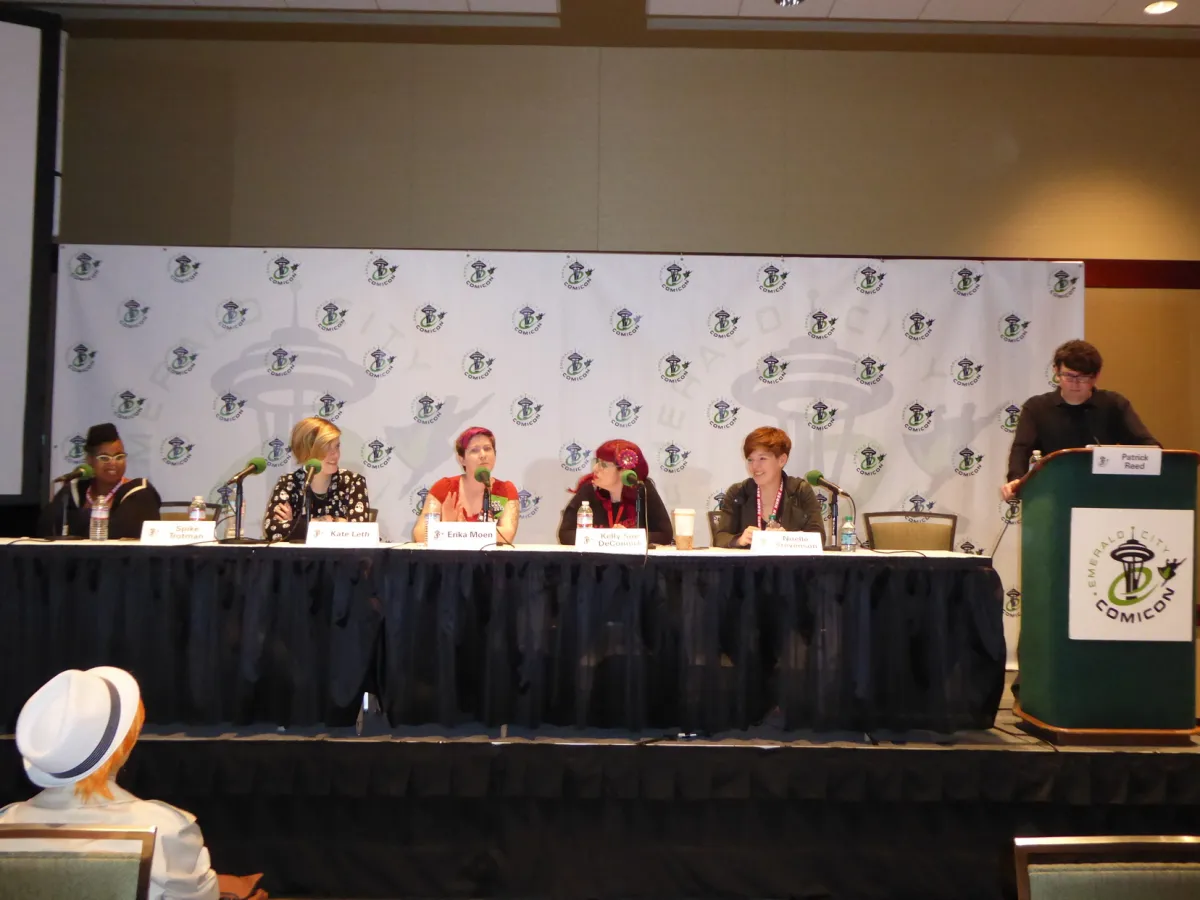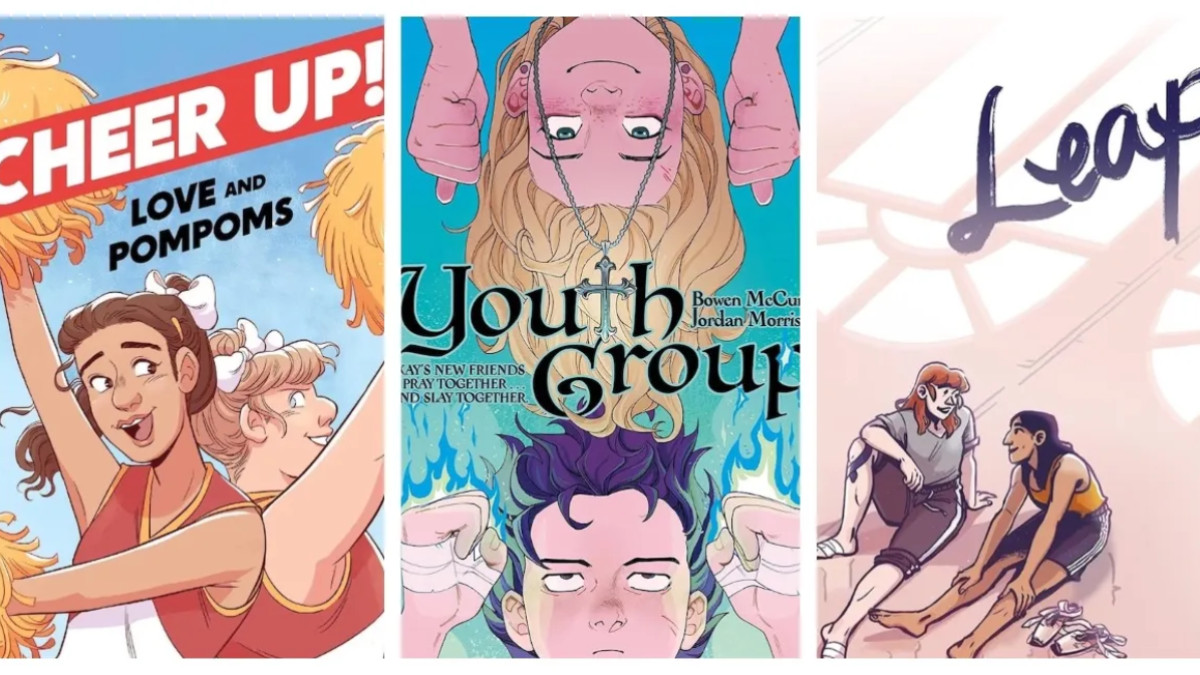Non-compliant and delightfully belligerent. @kellysue @Gingerhazing @Iron_Spike @kateleth @ErikaMoen #ECCC pic.twitter.com/aBIJeEwNk2
— Jessica (@BluePlasticJess) March 28, 2015
It’s safe to say I’ve never felt more at home during a con than I did at Emerald City Comicon’s “Being Non-Compliant” panel. I alternated between laughing so hard my sides hurt, to crying real, actual tears, and I did it all while listening to a line-up of bad-ass women in comics who are making the world a better place for all of us. Rock on.
“Being Non-Compliant” featured Kelly Sue DeConnick (Bitch Planet, Captain Marvel), Noelle Stevenson (Lumberjanes, Nimona), Kate Leth (Bravest Warriors, Edward Scissorhands), Erika Moen (Oh Joy Sex Toy), and Spike Trotman (Templar, Arizona, Smut Peddler) as they discussed where women stand in comics, where we’re going, and how we’re getting there – with a major push towards diversity and inclusivity at the forefront.
Speaking about her wildly-successful new comic for Image, Bitch Planet, and its catch phrase from which this panel got its name, DeConnick said that “in the world of Bitch Planet, the people who are labeled ‘non-compliant’ have been marginalized and criminalized for being who they are. I can’t speak to the people who have the label or the symbol in real life, because I’m certain their reasons are as varied as they are,” she clarified. “But what I think the statement they’re making is, I am a person who does not fit the box assigned to me. I am too tall or to short or too fat or too black or brown or too indigenous or too atheist or too slutty or too frumpy or too gay or too whatever the fuck it is my culture is going to judge me for today, and I refuse to see myself through your eyes. I refuse to see myself as imperfect because of that. And you will support me or you will get the fuck off.”
And there were many cheers.
When asked by moderator Patrick Reed if they intentionally write comics to inspire social change, DeConnick laughed. “I don’t actually set out to write political pamphlets. I’m always writing story first, and even before that I’m always writing character first – everything is born of character,” she said. “But I think that I have some very strong feelings about some things; in particular, ideas of fairness and justice. And it turns out that melds beautifully with the concepts of feminism, since they’re the same fucking thing.”
“I think it’s always pretty much just trying to say what you’re trying to say,” agreed Stevenson. “I’m not gonna probably put any swears in Lumberjanes. But other than that, I don’t know. You can get away with a lot of stuff. Kids aren’t dumb. They might not get it but they’re pretty smart, they’re gonna figure it out. So I write stuff that I like.”
Leth, on the other hand, did have a bit of an agenda (dun dun dun) when moving from online comics “about my feelings and sexual orientation” to mainstream all-ages comics. “One of the first things I decided I was going to do,” said Leth, “was to introduce more diverse and more queer characters. And it took me a while but I’m getting there. It’s happening and I managed to get lesbians in Bravest Warriors, so.”
And there were many more cheers.
.@kateleth at today’s non compliant panel #ECCC pic.twitter.com/aezyvoOMyP — Emerald City Comicon (@emeraldcitycon) March 28, 2015
Regardless of their original intent, however, there’s no doubt the panelists’ comics have brought about change in the industry – which, of course, brings with it some pushback. “I think people will characterize anything that they disagree with as ‘overly-political,'” said Trotman. “People refer to modern comics that aren’t necessarily exclusively about white, cis, hetero dudes beating up other white, cis, hetero dudes as ‘activism,’ which I find hilarious.”
“Suddenly when it’s not about you it’s someone waving a sign and shouting in your face,” Trotman continued. “But the thing is, when people write comics where themes of fairness, or well-adjusted erotica, feature prominently, suddenly they feel that what they like is being threatened. And they’re under the impression that you’re not there to just find space for your own voice, but there to silence them, and I think that’s where a lot of criticism of the direction comics are currently moving is coming from. A place of fear.”
“We come out and say, we want more diversity, we want more interesting characters, we want comics for everybody, and then the people who have always had comics for them think that we’re coming to take away their toys as if their toys will not always be there,” agreed Leth. “We just want some too.”
When asked about their current industry heroes, much of the panel agreed that the major fighters against Gamergate, including Anita Sarkeesian, Brianna Wu, and Zoe Quinn, have their utmost respect and support for what they have to fight against every day, and Trotman expressed hope that one day all these terrible internet harassers will grow up into adults who will regret what they’ve done with their lives. After a discussion of some of the more colorful trolls our panelists had dealt with (including one dude with a fedora avatar who tried to tell Stevenson that her comics were “sexist against men”), DeConnick just couldn’t keep it in any more, yelling “THAT IS NOT WHAT SEXISM MEANS.” Preach it.
“Big Two mainstream superhero comics are supposed to be about fairness, and the underdog, and taking care about people that are less fortunate that us,” DeConnick continued, after a breath. “Motherfucker, you cannot support Captain America and then be like, ‘Bitches get out.’ [Superheroes] are social justice warriors! I feel like – you need to read it again. Somehow the ’90s and pouches and lots of guns fucked everything up.”
Something many of the panelists spoke out in favor of was both the ability to make your own comics, through platforms like Tumblr or Kickstarter, and the crossover between creators of “adult” comics and children’s comics. “You might be surprised in the overlap in some of the artists who have worked for both Adventure Time and Smut Peddler,” laughed Leth. Moen shared that she made the conscious decision to stop her all-ages work in order to focus on Oh Joy Sex Toy, saying “I don’t want there to be an overlap between working with younger teens and adult content because I don’t want to get sued by a parent.” But Trotman assured the crowd that submitting a comic to Smut Peddler or writing adult work absolutely will not “vaporize any potential career in all-ages material.”
Guys the Non-Compliant panel was full up and it was wonderful #ECCC pic.twitter.com/9sbWhmTnWA
— Alison Bee (@VaGentlenerd) March 28, 2015
The panelists also stressed that just because a woman makes a comic doesn’t mean there’s going to be anything inherently “feminine”-coded within its pages. “There is more kissing and more romance in a single Brian Bendis comic than in ever single comic I have ever written put together,” said DeConnick. “That idea that ‘I’m a lady so these are going to be a particular kind of comic’ doesn’t hold. It doesn’t even hold within one person, let alone the spectrum of gender identity.” The panel veered off-course for a while as they all discussed how many man-baby tears appear in a single episode of InkMaster, but I can assure you it was a good and very important digression about the harmful expectations of hyper-masculinity, probably.
Ultimately, the panel was full of laughs and cheers and hopes for the future of comics. A future in which the Valkyries and Non-Compliant panels are standing room only; in which Bitch Planet sells 45,000 copies and every issue goes to a second printing; in which Smut Peddler blows past its Kickstarter goal in no time. Ladies love comics, ladies love making comics, and we’re not going anywhere. And the Non-Compliant panel made me feel like we definitely weren’t alone.
Are you following The Mary Sue on Twitter, Facebook, Tumblr, Pinterest, & Google +?









Published: Apr 3, 2015 07:00 pm